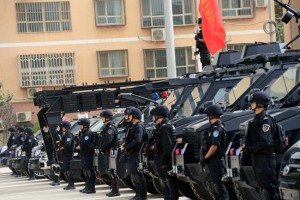Official’s Boast About Chinese Policies in Xinjiang Has Some Uyghurs Crying Foul
Radio Free Asia, 17 March 2015
 RFA Uyghur Service – Ethnic Uyghurs from Hotan have dismissed a government representative’s rosy account of Chinese policies in northwest China’s restive Xinjiang region.
RFA Uyghur Service – Ethnic Uyghurs from Hotan have dismissed a government representative’s rosy account of Chinese policies in northwest China’s restive Xinjiang region.
Aizezi Musa, a representative from Xinjiang who participated in the recent National People’s Congress, China’s annual parliamentary session on March 5-15 in Beijing, praised Beijing’s policies in an interview with state-run newspaper Global Times on violence in the region, bonus points awarded to Uyghurs on the country’s National College Entrance Examination, and regional development.
“Aizezi Musa lied and talked against the millions of Uyghurs for his own benefit,” a Uyghur farmer from Hotan, who declined to be named, told RFA’s Uyghur Service, responding to comments the official made. “A lot of people, including my neighbor’s friends can’t live freely. They were worried about their safety day and night until they fled from their own land. We don’t know where they are.”
Hotan (Hetian in Chinese) prefecture in southwestern part of Xinjiang has been a hotbed of violent stabbing and shooting incidents between ethnic, mostly Muslim Uyghurs and Chinese security forces, with attacks coming amid a string of assaults and bombings across the region, formally called the Xinjiang Uyghur Autonomous Region.
Musa, who is on the administrative commission of Hotan prefecture, had commented that the display of violence and deaths of innocent people in Hotan indicated “a radical and extremist mindset [among Uyghurs] that is basically opposite to the unanimous teachings of Islam.”
“When there are terrorist attacks in Xinjiang, some Western scholars apply double standards and make irresponsible remarks and accusations against China’s policy toward ethnic groups,” he told Global Times. “They indeed view China’s ethnic theories and policies in a biased way.”
But the Uyghur farmer said whenever a conflict between Chinese and Uyghurs erupts, the government always blames the Uyghurs.
“Some of the police are aware of the injustices against the Uyghurs when they arrest us,” he said, adding that he was once arrested for attending a Friday prayer service.
A Uyghur police officer tried to help him, but a Chinese one would not let him release the farmer, he said.
“Aizezi Musa knows about these situations,” the farmer told RFA. “In fact, all the government workers and Uyghur puppets governing us know how China oppresses Uyghurs. If there is no oppression why do most of the Uyghurs hate their lives?”
Mehmetjan Osman, acting president of the Canada-based East Turkistan government in exile, also hit out at Musa’s comments on the connection between religion and violence resistance.
“The Uyghur struggle has nothing to do with religious radicalism,” he told RFA. “All Uyghur resistance fighters are fighting to get freedom for their people from Chinese colonialism and oppression. Of course, Uyghurs are Muslims, and Islam is reflected in their resistance.”
No bonus points for Musa
The farmer also denounced Musa’s comments about bonus points awarded to ethnic minority students on the National College Entrance Examination, which has given some Xinjiang students access to the same education as that of their counterparts in China’s developed eastern coastal areas.
He called the policy “poisonous.”
“If they want to help Uyghurs and want to provide high-quality education, why don’t they bring that education to Uyghurs and build schools here?,” he asked. “Why do they have to separate young kids from their families and their culture at young age? The purpose of the Chinese government is to assimilate Uyghurs and destroy our culture and religion by changing our kids.”
The farmer also denounced Musa’s comments on China’s adoption of a slew of preferential policies that provide funds, technology and aid to undeveloped regions like Xinjiang.
In 2010, Xinjiang set up a mechanism under which 19 provinces or major cities, including prosperous Beijing, Shanghai and Guangdong Province, would provide financial and technological support to the autonomous region, Musa said.
But the farmer from Hotan said most Uyghurs, and especially farmers, never see the financial assistance, and the policy has amounted to the Chinese moving in and taking the region’s resources.
“What we have seen from China’s development of Xinjiang is an increased Chinese police and army presence, increased Chinese teachings in Uyghur schools, and a hugely increased Chinese population in our lands,” he said.
“The Chinese government said it is investing in and developing us. What are they developing? What this really means for Uyghurs is stealing our natural resources.”
As an example, he cited Chinese companies and private Chinese investors digging tons of gold every year from Hotan gold-producing area.
Other recent clashes
Clashes and other incidents involving Chinese police or security forces and Hotan’s Uyghur residents have occurred this year.
Last week, police shot and killed as many as seven ethnic Uyghurs who had been “acting suspiciously” while they gathered at a restaurant in Qaraqash (Moyu in Chinese) county, prompting a security clampdown.
In February, a Uyghur farmer on his way to work in the fields was shot and killed by police in Bashquduqla village of Purchaqchi town in Hotan after he pulled a knife on officers attempting to detain him for acting “suspicious,” sources told RFA.
The month before, three Uyghur teenagers had killed three unarmed security personnel after the teenagers failed to stop at a security checkpoint in Keriye county (Yutian in Chinese) and resisted efforts to detain them.
Reported by RFA’s Uyghur Service. Written in English by Roseanne Gerin.
http://www.rfa.org/english/news/uyghur/uyghurs-cry-foul-over-officials-comments-03162015171011.html

